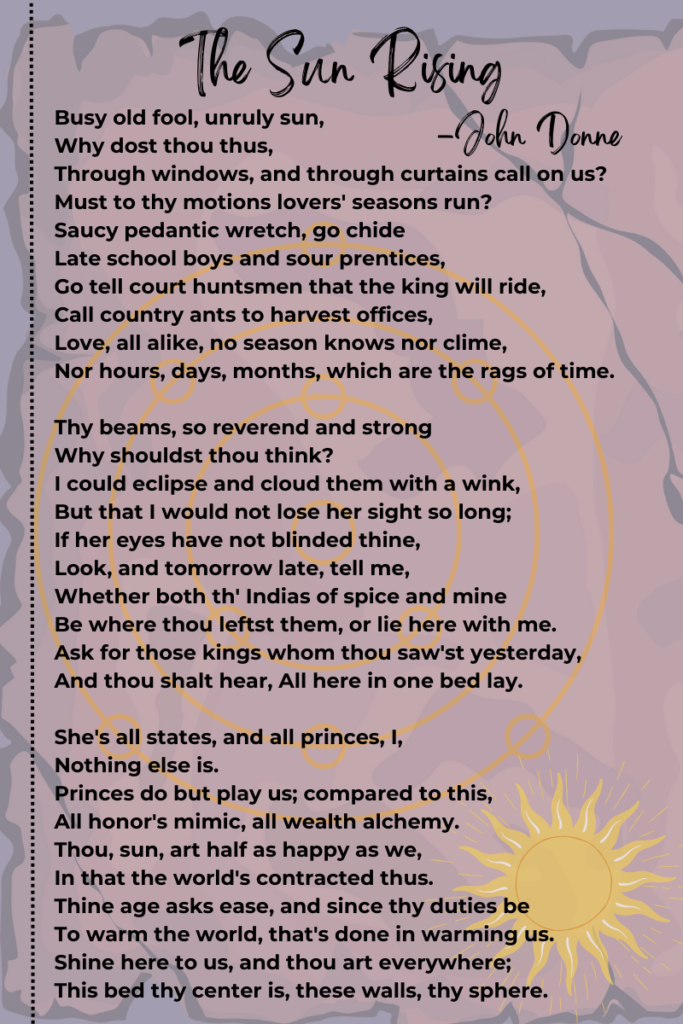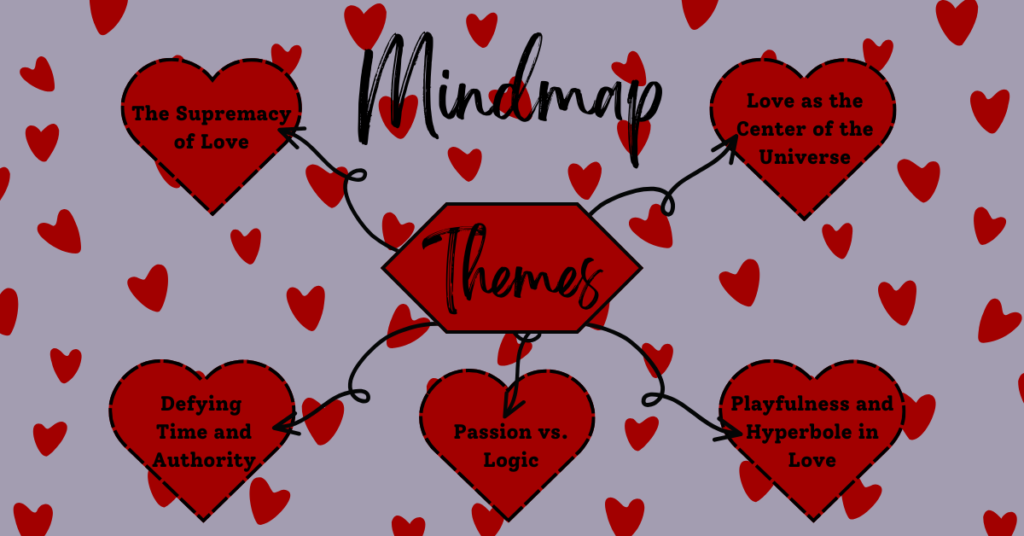Physical Address
304 North Cardinal St.
Dorchester Center, MA 02124
Physical Address
304 North Cardinal St.
Dorchester Center, MA 02124

This Valentine’s Day, I would like to revisit one of my favorite romantic poems, “The Sun Rising” by John Donne. This timeless poem surely aged like a fine wine. Unlike Samuel Johnson, who did not appreciate metaphysical poetry, I am personally captivated by it. The metaphysical poets’ use of surprising and unexpected comparisons draws me in and makes me want to read poetry all day long. In this article, we are going to take a closer look at “The Sun Rising” by John Donne and why it’s his ultimate love poem.
When we hear about the term “metaphysical poets,” the one who immediately comes to mind is John Donne. John Donne wrote about love, adventure, seduction, and deeply spiritual and religious poems later in his life. He incorporated clever and witty wordplay in his poem. The metaphysical poets are well-known for using metaphysical conceits in their poems.
Metaphysical conceits are striking, intellectual, and unusual comparisons, for example, lovers being compared to a compass in “A Valediction: Forbidding Mourning” by John Donne. Metaphysical poets also explored deep themes in their poems. They pondered on ideas such as the nature of the universe, love, time, death, and more.
These poets were fond of using paradoxes and contradictions in their poems. Take “A Valediction: Forbidden Mourning” for an example where John Donne believes that separation between lovers deepens their connection and strengthens love. He believes love doesn’t fade with time and separation but becomes strong.
You will see that metaphysical poems use dramatic and conversational tones instead of flowery language commonly used in poems. They feel more like a debate or a direct conversation. While the Romantic poets talked about an idealized form of love, metaphysical poems believe in love being a combination of physical passion and spiritual connection. Love, in their opinion, is body and soul working together in perfect harmony.
The metaphysical poems have unusual rhyme and structure. These poems are unpredictable. They talk about complex topics using irregular meters, and unexpected parallels, and they are thought-provoking, making reading metaphysical poems an enjoyable experience.

In the first stanza of the poem, the speaker of the poem berates the sun for disturbing their sleep. He personifies the sun and treats it as an uninvited houseguest. He inquires if the lovers should schedule their day around the sun’s movement in the sky.
He chastises the sun and asks it to berate the late schoolboys and apprentices and to tell the court huntsmen that the king will ride in the morning. He wants the sun to go and bother the farmworkers to harvest their farms instead of bothering the lovers.
The speaker says that love is not influenced by different seasons and weather. Love doesn’t revolve around different hours, days, and months, which are irrelevant and will pass like the “rags of time.”
In the second stanza, the speaker states that the sun is so confident because his beams are “reverend and strong.” He says he could easily close his eyes to block the sun’s rays. However, he doesn’t want to close his eyes for long, as he wants to see his lover.
He says that his lover’s eyes are so bright that they can even blind the sun. The speaker wonders if the sun will find the East and West Indies and the kings where he left them. He believes that everything important is already here with them in their bed.
In the third stanza of the poem, the speaker equates his lover to all the states and himself to all the princes. He states that nothing else should matter. The princes only copy them, and the honor is a cheap imitation; attaining wealth is futile.
Here the speaker uses metaphysical conceit, where he states that their room is the center of the universe instead of the sun. He says that the sun should be relieved that he only has to shine in their bedroom instead of the whole world because the whole world fits into their bedroom. Therefore, he should only warm them up and shine on them. Their bed is the center, and the room’s walls are the sphere of the solar system.
“The Sun Rising” is John Donne’s playful romantic poem. It is a bold poem openly challenging the commonly held beliefs about the universe, the solar system, the sun, and power. Let’s take a closer look at the key themes present in the poem.

In the poem, John Donne claims that love is supreme. He states that love is even more powerful than the sun. Time and other worldly affairs are irrelevant in the presence of love. He chastises the sun and doesn’t believe in its authority. He claims that he and his lover are more important than the princes, kings, worldly riches, and other external commitments. For the speaker in the poem, nothing else matters except love.
In the poem, the speaker repeatedly questions the authority of the sun. The sun, as we all know, stands for time, external control, and routine. Our day starts with sunrise and ends when the sun sets. However, the speaker in this poem doesn’t acknowledge the sun’s authority. He chides the sun for interfering with their sleep. He further states that the whole world is inside their bedroom so the sun should solely shine on them.
John Donne uses the metaphysical conceit in his poem where he equates his bedroom as the center of the universe. His bedroom also becomes the whole world. The speaker of the poem asserts that he and his lover are the whole world and the center of the universe. Therefore, he will not obey the sun’s authority. Their love is so powerful that it alters the structure of the universe and existence.
The poem juxtaposes our logical, rational, and structured world with emotional and all-consuming passionate love. The speaker of this poem claims that love is more valuable than external obligations and duties. He is rejecting responsibility for ardent and passionate love.
The tone of the poem is playful, witty, and humorous. John Donne uses metaphysical conceits and exaggeration in this poem. The speaker of the poem humorously argues with the sun. The speaker knows the sun won’t listen, but his arguments reveal the enormity of his love. At the end of the poem, he challenges the sun’s authority and makes the sun their servant instead of a barrier to their love.
“The Sun Rising” is a timeless masterpiece of a romantic poem written by John Donne. The poem focuses on love’s ability to challenge reality, time, authority, and external forces. The poem portrays romantic love as intense, consuming, passionate, and all-encompassing, which makes it a perfect poem for Valentine’s Day.
If you want to read more poem reviews, check out the review of “The Chimney Sweeper” by William Blake here.
Works Cited:
Donne, John. The Sun Rising. Poetry Foundation, 13 Feb. 2025, https://www.poetryfoundation.org/poems/44129/the-sun-rising. Accessed 13 Feb. 2025